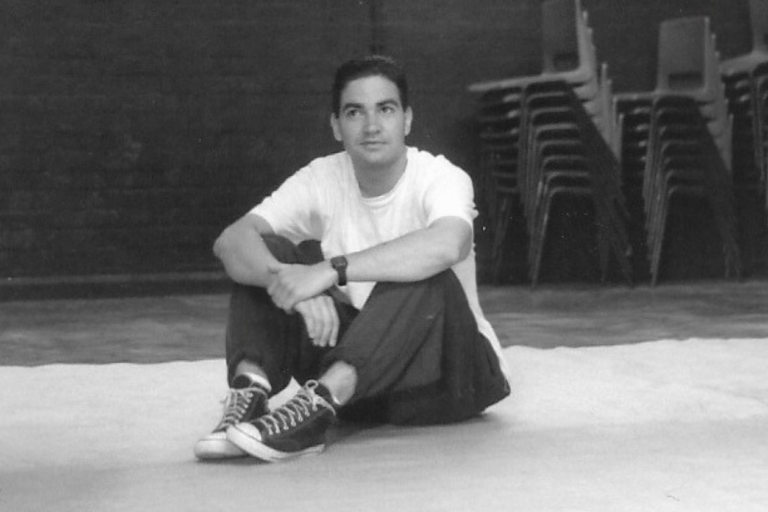
Creative Director Mark Sands talks about coming out in the 80s, Section 28 and seeing the original 1988 production of Philip Osment’s This Island’s Mine.
I knew I had an attraction to the same sex. Back then, these things get explained away as hero worship; in retrospect, it was because I was gay. I just didn’t have the reference points, the understanding, the language, the role models or the confidence to articulate it. I had a girlfriend, whom I genuinely loved, in my late teens, and my first boyfriend at 17, whom I also loved. It’s an indictment of the times that he is sadly no longer with us.
I know the exact date I came out – it was the 26th May 1989 – and I was 20. My friend and I used to spend our weekends driving from Portsmouth to Southampton in his Robin Reliant to a club called Magnum’s where I became obsessed with someone. After many months of stalking him across the 3 dance floors, we had a date. Not a great one – I was an insecure wreck – but good enough that a second was planned. This time I made my way to Southampton alone by train only to be stood up. Drowning my sorrows in Bacardi and Coke, an older lesbian friend drove me back in her yellow Mini ending with me breaking down, drunk in front of my parents. There was a moment of comedy in amongst all the dramatic sobbing because the person who stood me up had the same name as my brother and in blubbing on about him, my parents thought I’d actually been let down by my brother, not my date.
But it happened, that night, in 1989, I came out.
I had the best of times in the 80s; but it was also one of the harshest of times. Media homophobia was rampant and the introduction of Section 28* caused a genuine unease, not least because it felt like an institutional act of persecution. No one really understood how the policy was to be implemented, leading to a climate of uncertainty about the context in which you were ‘allowed’ to talk openly and positively about being gay and lesbian. If we didn’t already feel like exiles in our own country, Section 28 certainly made sure we were.
It was the first time I had ever seen a piece of ‘gay theatre’. It was important because two parts of me – my interest in theatre and being gay – suddenly came together in one experience. I remember distinctly the absolute fear and feeling of sickness of having to walk through the door of that venue, not knowing who might see me going in. This was despite having hung out in gay bars and clubs since I was 16 and having the aforementioned yearlong gay relationship. I wasn’t out to my family at this stage; such was the climate of fear and prejudice I grew up in, so it still took a huge amount of courage to be seen attending something so brazen about sexuality.
It was a life changing experience, to be in a room with people just like me, away from the context of a bar or club, and to have something so beautiful and articulate speak about my life in such a positive, warm, humourous, enlightening way.
To be celebrated in public was a far cry from being shamed by the media and government. It was an awakening, not just because it made sense of my life to myself, but also because it showed me the power of theatre. At a time when positive LGBT role models were far from visible, when coming out was seen as a career killer for actors, when The Sun newspaper headlines screamed ‘Eastbenders’ across its front page, here was a company, a play and a group of people that were unashamedly positive. And I wanted to be just like them and play my part in promoting that positive vision.
Now here we are, 31 years on, about to open the first ever revival of This Island’s Mine since the original back in 1988.
Is it still relevant? Yes. Absolutely. We must never forget our darkest times and what it was like before hard-earned rights were won. I remember clearly the shift that took place with the introduction of Section 28. It empowered and united so many of us, but it also fanned the flames of prejudice by giving legitimacy to homophobia. I see it again, with the rise of far right sentiments and anti-LGBT protests outside schools in Birmingham. As Miss Rosenblum in This Island’s Mine warns her lodger:
‘Beware!
It can happen again.
I see the signs, Mr Martin,
They want someone to blame.’
At the same time, there is much to celebrate. We have come a long way and the play is truly a celebration of love, defiance and unity. That’s the power of the play and I hope it has the same liberating, uplifting, life changing impact on others in 2019 as it did for me back in 1988.
This Island’s Mine is playing at the King’s Head Theatre.

Also By Kings Head Theatre:
Manchester’s Gay Village: Then and Now
Beauty And The Beast: A Gender Swap Performance


The King’s Head Theatre was established in 1970. Passionate about championing ethically produced fringe theatre, we are known for our challenging work and support of young artists. Last year 116,151 audience members saw a show of ours: 44,607 at our 110-seater home on Upper Street and 71,544 elsewhere. At our home in Islington we had 774 performances last year of 95 different shows. We are committed to fighting prejudice through the work we stage, the artists and staff we work with and by producing work for minority audience groups. We believe in fair pay for all on the fringe and create accessible routes for early career artists to stage their work; work we are passionate about. Last year we announced the theatre is on the move. Subject to a fundraising campaign, the King’s Head Theatre will move into a custom-built space in the heart of Islington Square, directly behind its current home securing the future of the venue for generations to come.
Read Full Profile© 2021 TheatreArtLife. All rights reserved.

Thank you so much for reading, but you have now reached your free article limit for this month.
Our contributors are currently writing more articles for you to enjoy.
To keep reading, all you have to do is become a subscriber and then you can read unlimited articles anytime.
Your investment will help us continue to ignite connections across the globe in live entertainment and build this community for industry professionals.